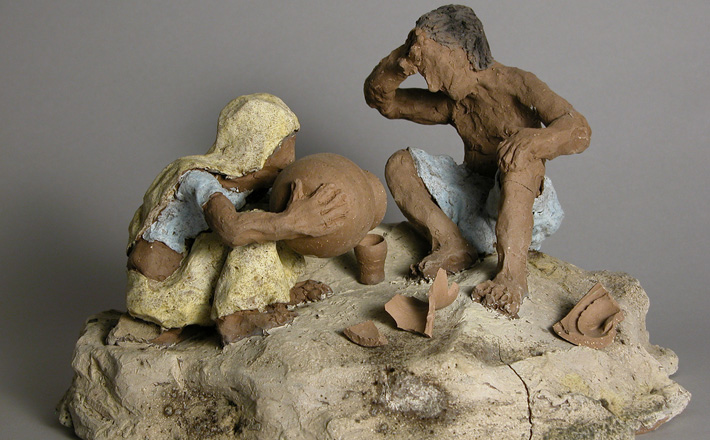Commentary on Psalm 63:1-8
In a recent gathering, one of my students led a guided meditation.
She asked us all to close our eyes and remember a situation in which we felt truly loved and secure. We were to focus there for a while and then envelop that place in a circle of radiant pink light. (The pink didn’t work so well for me; I felt off and on like I was bouncing around in a bubble of Bazooka gum. But I imagine you could use a different color without making a hash of the exercise.) Resting comfortably in this place, we awaited whoever passed through the light to enter in. And we greeted them, enemy and friend, family and stranger. It was amazing who showed up, the memories stirred, and the unfinished business that no longer stayed buried. Here from this point of safety we explored the possibility of receiving each visitor with love and compassion.
In these verses from Psalm 63, the psalmist takes refuge in the place where he feels truly loved and secure — in the shadow of the wings of God. There is intense longing: “O God, you are my God, I seek you/my soul thirsts for you/my flesh faints for you/as in a dry and weary land where there is no water” (verse 1). There is also ecstatic fulfillment: “Because your steadfast love is better than life/my lips will praise you” (verse 3). The psalmist encircles this place of desire and delight not with light but with song, a song of trust and thanksgiving powerful enough to sustain him through threatening danger.
The lectionary does us a disservice by editing what we sing as the psalmody in worship. Psalm 63 is actually eleven verses long, not eight, and the last three show the psalmist exulting over his enemies, who shall die by the sword and become food for jackals. He is sure that the God who upholds him will certainly do this. This is hardly welcoming them into a beneficent place, to share with them the peace of your holy realm.
It is important not to impose a kind of political correctness on these honest and fierce declarations. Many people recoil from them as decidedly un-Christlike: hold the jackals and turn the other cheek, lest living by the sword you die by the sword. Indeed, some Christian communities sought to embody Christ’s “new law” strictly, even to the point of estranging themselves from the world around them. In their view it was all too easy to justify compromises with the world that would accumulate to the point that the salt lost its savor. But the contrasting view of discipleship held that Christians lived in the world to uphold justice and keep the ever threatening flood of evil at bay. They gave their lives for it, and they took lives as well, and when the mouths of liars were stopped (verse 11), they rejoiced in the Lord.
Some years ago, I was a delegate to an assembly of the Lutheran World Federation. The folks responsible for ecumenical and inter-religious studies made an encouraging presentation about the number of dialogues either progressing or initiated. During the question and answer period, a delegate from an African nation with an overwhelming Muslim majority stood up and asked the assembly to consider a different point of view. In his land, Christians were being forced out of government positions and feared their children would soon be barred from the schools. He heard talk of nothing but dialogue, but in his homeland the religious majority had no interest in talking or sharing power. The Christian community was afraid and anticipated increasing persecution. He asked the delegates, “If it comes to bloodshed, will you stand by us?” It is a reminder that the last three verses of this psalm could echo meaningfully from the lips of some of our Christian brothers and sisters around the world.
It is not always easy to see the hand of God at work in our lives or to claim God’s steadfast love for oneself. Saint Augustine in his Confessions looked back over the early years of his life and in hindsight could see God at work, accomplishing God’s purposes for him in unlikely circumstances. This remembrance of things past, of God’s care for us in often unexpected ways, becomes the safe place at the center of our lives and the assurance that God will continue to be with us in the years ahead.
“My soul is satisfied as with a rich feast,
and my mouth praises you with joyful lips,
when I think of you on my bed,
and meditate on you in the watches of the night;
for you have been my help,
and in the shadow of your wings I sing for joy.
My soul clings to you;
your right hand upholds me” (verses 5-8).
Here we must come when hostility threatens, when loss and grief leave us feeling abandoned. For here God’s love claims us. In the shadow of God’s wings, we will sing for joy.


March 7, 2010